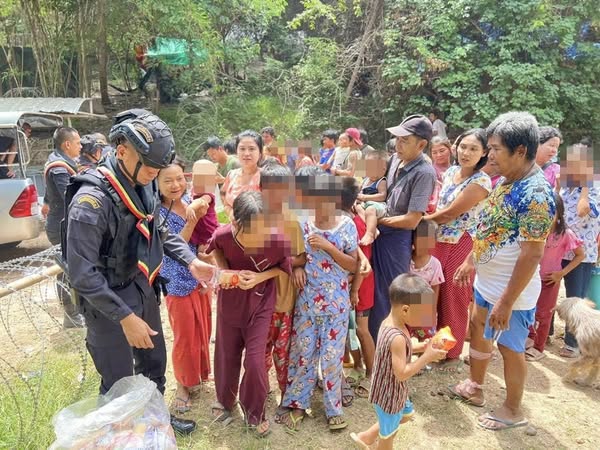Tens of thousands of civilians displaced by recent clashes near the Htee Khee border in Tanintharyi Region’s Dawei Township are facing dire humanitarian conditions, as access to aid remains severely restricted due to ongoing security concerns, according to local sources.
The mass displacement followed intense fighting near the Myanmar-Thailand border, where anti-junta forces launched an offensive to capture the strategic Htee Khee military base. Civilians fleeing the violence have sought refuge near the border area. Although Thai authorities have allowed limited humanitarian support through local charities, the transport of dry goods across the border remains restricted.
Some displaced persons have reportedly received assistance from the Karen National Union (KNU), but delivery of food and supplies through the Tavoy–Myitta road has been blocked by military junta checkpoints, leaving around 20,000 people at risk of severe shortages, a local source said.

“Aid convoys can’t get through because the military still controls the area and roads are closed. Thailand also isn’t allowing any dry goods or cargo to be transported across the border. Only pre-cooked meals in small packages are permitted by Thai authorities,” the source explained.
The KNU launched its operation to seize the Htee Khee base on May 2, and successfully captured it on May 9, according to a statement from the KNU central command. Since then, thousands of Myanmar nationals have crossed into Thailand or taken shelter near the border. However, many are unable to legally enter Thailand and are forced to stay in precarious conditions in border zones.
A human rights activist stated, “Thailand hasn’t granted them entry, citing national laws. While it may quietly allow some support through local units, the Thai government’s official policy is to avoid openly assisting internally displaced persons (IDPs) or war refugees, especially when it doesn’t serve their interests or risks upsetting the junta.”
Though the junta has not carried out any aerial or artillery attacks since losing control of the base, the area remains hazardous due to landmines, unexploded ordnance, and cluster bombs left behind by retreating junta troops, a ground source reported.
“There have been no more airstrikes or artillery attacks since they lost the base. But there are still landmines and large weapons scattered across a wide 10-mile radius that need to be cleared,” the source said.
Military analysts note that the Htee Khee base was a major strategic point in border trade routes, linking Myawaddy–Mae Sot, Phaya Thonesu–Kanchanaburi, Htee Khee–Kanchanaburi, and Myeik–Prachuap. The seizure marks a significant milestone for anti-junta resistance forces, being one of the first major border trade zones to fall under their control.
On May 10, the KNU’s Myeik-Dawei District Office also issued a statement in Thai, urging Thai citizens living near the border to understand the reason for their military action and the current situation.
